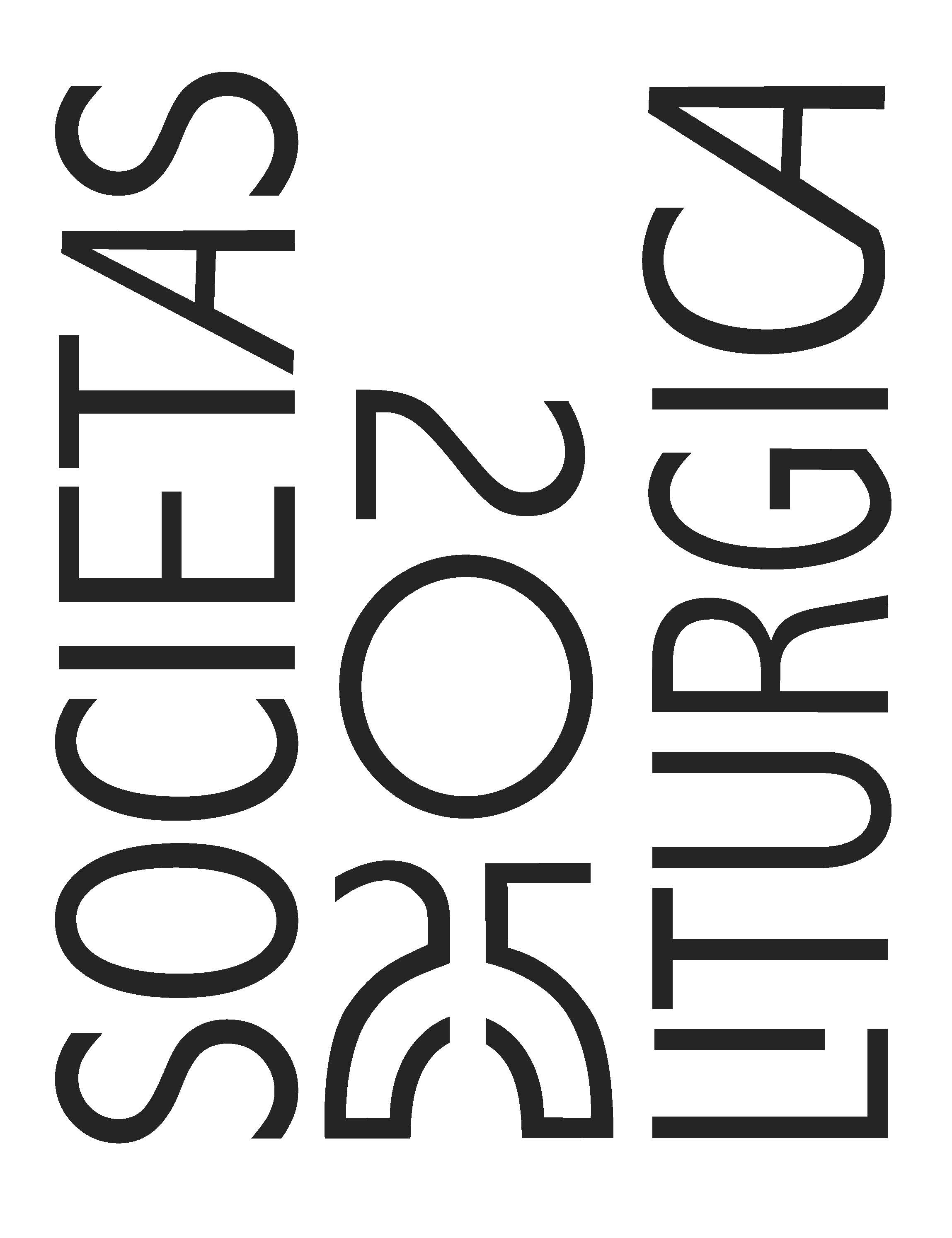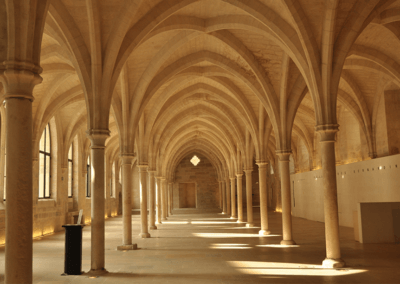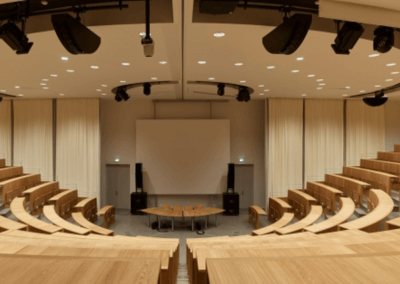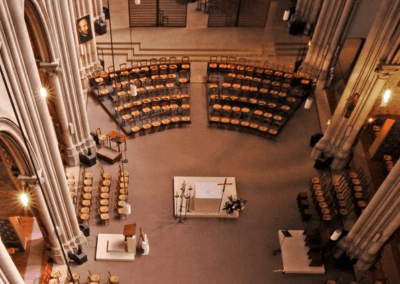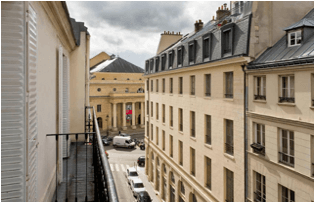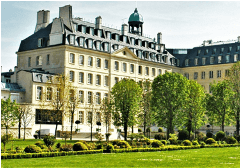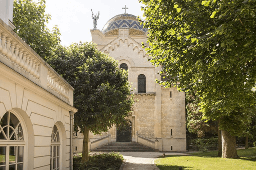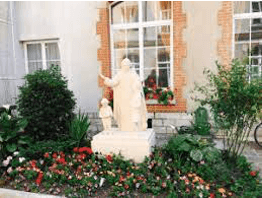The Liturgical Assembly
in its Spaces
Congress – Paris 2025
28 July to 1 August
Registration for the Congress opens on 20 January – please see the booking Inforation below for detais
Members must log in to their account to take advantage of the members’ rates for the Congress registration fee.
Members’ rates are available only to members who have paid their membership fees for 2025.
- Congress Statement
- Keynote Papers
- List of Papers
- Booking Information
- Congress Map of Paris
- Congress Schedule
- Scholarship Criteria
- Supporting Institutions
Problématique du Congrès / Congress statement / Konferenzerklärung
The Congress statement and key themes are set out here :-
Conférences majeures du Congrès Paris 2025
Keynote Lectures for the 2025 Congress
Presidential Address:
Gilles Drouin
Institut Supérieur de Liturgie
Directeur, Institut Catholique de Paris
Keynote Speakers:
1-Espace, assemblée, communauté et cultures / Space, assembly, community and cultures / Raum, Versammlung, Gemeinschaft und Kulturen
Jean-Marie Duthilleul (Fr)
Libérer l’espace liturgique / Freeing up liturgical space / Befreiung des liturgischen Raums
- Jean-Marie Duthilleul, ingénieur et architecte, ayant beaucoup traité le sujet de l’accueil des foules, a été appelé par le Cardinal Lustiger pour aménager les sites d’accueil du Pape Jean-Paul II lors des JMJ de Paris en 1997. Puis il a travaillé avec le cardinal pour l’aménagement liturgique de Notre-Dame de Paris, et conçu avec lui l’église paroissiale de Saint François de Molitor à Paris. Ces expériences l’ont amené à être appelé pour concevoir et réaliser l’aménagement de nombreuses cathédrales et églises françaises et suisses pour des communautés paroissiales ou monastiques.
- Jean-Marie Duthilleul, an engineer and architect who has dealt extensively with the subject of welcoming crowds, was called in by Cardinal Lustiger to design the reception sites for Pope John Paul II at the World Youth Day in Paris in 1997. He then worked with the Cardinal on the liturgical layout of Notre-Dame de Paris, and designed the parish church of Saint François de Molitor in Paris. These experiences led him to be called upon to design and build numerous French and Swiss cathedrals and churches for parish and monastic communities.
- Jean-Marie Duthilleul, Ingenieur und Architekt, der sich intensiv mit dem Thema des Empfangs von Menschenmengen beschäftigt hat, wurde von Kardinal Lustiger gebeten, den Empfangsbereich für Papst Johannes Paul II. während des Weltjugendtags 1997 in Paris zu gestalten. Anschließend arbeitete er mit dem Kardinal bei der liturgischen Ausgestaltung von Notre-Dame de Paris zusammen und entwarf mit ihm die Pfarrkirche Saint François de Molitor in Paris. Aufgrund dieser Erfahrungen wurde er dazu berufen, die Ausstattung zahlreicher Kathedralen und Kirchen in Frankreich und der Schweiz für Pfarr- oder Klostergemeinschaften zu entwerfen und umzusetzen.
Richard M Tambwe (Rép. Démocratique du Congo)
Les espaces liturgiques dans leur dimension communautaire: une vision africaine de l’espace sacré / Liturgical Spaces in their Community Dimension: An African Vision of Sacred Space / Liturgische Räume in ihrer gemeinschaftlichen Dimension: Eine afrikanische Vision des heiligen Raums
- Formé en architecture : University of Notre Dame, IN (MARDU, 2016) et IBTP-Kinshasa (diplôme d’architecte, 2004), en théologie : Duquesne University, PA (ABD), Santa Clara University, CA (Masters, 2010) & Hekima College, Kenya (BA, 2008), et en philosophie : Université Loyola, RD Congo (BA, 1995), Richard Tambwe est doctorant avec une recherche sur le thème suivant: “Reimagining God’s Congolese Home: Decolonization and Church Architecture.” Il est intéressé par la pensée décoloniale et son application en théologie et en architecture.
- Trained in architecture: University of Notre Dame, IN (MARDU, 2016) and IBTP-Kinshasa (Diploma in Architecture, 2004), in theology: Duquesne University, PA (ABD), Santa Clara University, CA (Masters, 2010) & Hekima College, Kenya (BA, 2008), and in philosophy: Loyola University, DR Congo (BA, 1995), Richard Tambwe is a doctoral student researching “Reimagining God’s Congolese Home: Decolonization and Church Architecture”. He is interested in decolonial thought and its application to theology and architecture.
- Studium der Architektur: University of Notre Dame, IN (MARDU, 2016) und IBTP-Kinshasa (Abschluss als Architekt, 2004), der Theologie: Duquesne University, PA (ABD), Santa Clara University, CA (Masters, 2010) & Hekima College, Kenia (BA, 2008), und der Philosophie: Loyola University, RD Congo (BA, 1995), Richard Tambwe ist Doktorand mit einem Forschungsprojekt zum Thema: „Reimagining God’s Congolese Home: Decolonization and Church Architecture“. Sein Forschungsgebiet sind dekoloniales Denken und dessen Anwendung in Theologie und Architektur.
2-Accueil, inclusion, exclusion dans l’espace et l’assemblée liturgiques / Welcome, inclusion, exclusion in liturgical space and assembly / Aufnahme, Inklusion, Exklusion im liturgischen Raum und in der liturgischen Versammlung
Nina Glibetic (Sb)
Sacred Space Between Inclusion and Exclusion: The Dynamics of Liturgical Access in the Christian East / L’espace sacré entre inclusion et exclusion : La dynamique de l’accès à la liturgie dans l’Orient chrétien / Sakraler Raum zwischen Inklusion und Exklusion: Die Dynamik des liturgischen Zugangs im christlichen Osten
- Nina Glibetić is assistant professor of liturgical studies at Yale’s Divinity School and Institute of Sacred Music, specializing in Eastern Christian liturgy. She earned her doctorate at the Pontifical Oriental Institute in Rome. Currently a Humboldt Fellow at the University of Regensburg, she is working on a book that examines, among other themes, the politics of access to worship spaces in the premodern Christian East.
- Nina Glibetić est professeur adjoint d’études liturgiques à la Divinity School et à l’Institute of Sacred Music de Yale, spécialisée dans la liturgie chrétienne orientale. Elle a obtenu son doctorat à l’Institut pontifical oriental de Rome. Actuellement boursière Humboldt à l’université de Ratisbonne, elle prépare un ouvrage qui examine, entre autres, la politique d’accès aux espaces de culte dans l’Orient chrétien prémoderne.
- Nina Glibetić ist Assistenzprofessorin für Liturgische Studien an der Divinity School und am Institute of Sacred Music in Yale und hat sich auf die östliche christliche Liturgie spezialisiert. Sie promovierte am Päpstlichen Orientalischen Institut in Rom. Derzeit ist sie Humboldt-Stipendiatin an der Universität Regensburg und arbeitet an einem Buch, in dem sie unter anderem die Politik des Zugangs zu Gottesdiensträumen im vormodernen christlichen Orient untersucht.
Luiz Carlos Texeira Coelho (Bra)
Droit à la ville (de Dieu) : Cartographie de la ségrégation dans l’espace liturgique comme métaphore urbaine / Recht auf (Gottes) Stadt : Kartierung der Segregation im liturgischen Raum als urbane Metapher / Straight to the City (of God): Mapping segregation in liturgical space as urban metaphor
- Luiz est titulaire d’un diplôme de premier cycle en génie géomatique (Institut militaire d’ingénierie), d’une maîtrise en informatique (Université fédérale d’Amazonas) et d’un doctorat en urbanisme et aménagement urbain et du territoire (Université fédérale de Rio de Janeiro), avec des certifications d’enseignement en mathématiques et en géographie. Il est professeur à l’Université d’État de Rio de Janeiro. Parallèlement à ce parcours, il est également titulaire d’un diplôme de premier cycle en théologie (Séminaire Egmont Machado Krischke et Collège Uni de Vitória) et d’un doctorat en liturgie (Sewanee: the University of the South). Né au Brésil, il est également citoyen du Portugal et de l’Espagne et membre de l’ACEBRA (Asociación de Científicos Españoles en Brasil). Site web : www.teixeiracoelho.com.
- Luiz holds an undergraduate degree in Geomatics Engineering (Military Institute of Engineering), a Master’s degree in Computer Science (Federal University of Amazonas) and a PhD in Urban and Regional Planning (Federal University of Rio de Janeiro), with teaching certifications in Mathematics and Geography. He is a professor at the State University of Rio de Janeiro. Alongside this background, he also holds an undergraduate degree in theology (Egmont Machado Krischke Seminary and Vitória Uni College) and a doctorate in liturgy (Sewanee: the University of the South). Born in Brazil, he is also a citizen of Portugal and Spain and a member of ACEBRA (Asociación de Científicos Españoles en Brasil). Website: www.teixeiracoelho.com.
- Luiz hat einen Bachelor-Abschluss in Geomatik (Militärisches Institut für Ingenieurwesen), einen Master-Abschluss in Informatik (Bundesuniversität Amazonas) und einen Doktortitel in Stadt- und Raumplanung (Bundesuniversität Rio de Janeiro) mit Lehrbefähigungen in Mathematik und Geographie. Er ist Professor an der Staatlichen Universität von Rio de Janeiro. Darüber hinaus hat er einen Bachelor-Abschluss in Theologie (Egmont Machado Krischke Seminar und Uni-College Vitória) und einen Doktortitel in Liturgie (Sewanee: the University of the South). Der gebürtige Brasilianer ist außerdem portugiesischer und spanischer Staatsbürger und Mitglied von ACEBRA (Asociación de Científicos Españoles en Brasil). Website: www.teixeiracoelho.com .
3- Sacré et profane: espaces en recomposition / Sacred and profane: recomposing spaces / Sakrales und Profanes: Räume, die sich neu zusammensetzen
Jeanne Halgren Kilde (USA)
From Sacred and Profane to Spiritual Space: How the rise of spirituality in the late 20th century transformed spatial power and reinterpreted Christian space / Vom heiligen und profanen zum spirituellen Raum: Wie der Aufstieg der Spiritualität im späten 20. Jahrhundert die räumliche Macht verändert und den christlichen Raum neu interpretiert / De l’espace sacré et profane à l’espace spirituel : Comment l’essor de la spiritualité à la fin du 20e siècle a transformé le pouvoir spatial et réinterprété l’espace chrétien
- Jeanne Halgren Kilde is a cultural historian of religion in the United States whose research focuses on the role of religious space and architecture as constitutive components of religion and religious experience. She is the author of When Church Became Theatre: The Transformation of Evangelical Architecture and Worship (Oxford 2002), Sacred Power, Sacred Space: An Introduction to Christian Architecture (Oxford 2008), and several other works on religious space. She also edited the Oxford Handbook of Religious Space and Place (2022).
- Jeanne Halgren Kilde est une historienne culturelle des religions aux États-Unis dont les recherches portent sur le rôle de l’espace religieux et de l’architecture en tant qu’éléments constitutifs de la religion et de l’expérience religieuse. Elle est l’auteur de When Church Became Theatre : The Transformation of Evangelical Architecture and Worship (Oxford 2002), Sacred Power, Sacred Space : An Introduction to Christian Architecture (Oxford 2008), et de plusieurs autres ouvrages sur l’espace religieux. Elle a également édité le Oxford Handbook of Religious Space and Place (2022).
- Jeanne Halgren Kilde ist eine US-amerikanische Religionshistorikerin, deren Forschungsschwerpunkt in der Rolle des religiösen Raums und der Architektur – als konstitutive Bestandteile von Religion und religiöser Erfahrung – liegt. Sie ist die Autorin von “When Church Became Theatre: The Transformation of Evangelical Architecture and Worship” (Oxford 2002), “Sacred Power, Sacred Space: An Introduction to Christian Architecture” (Oxford 2008) und mehrerer anderer Publikationen zum Thema des religiösen Raumes. Sie ist Herausgeberin des Oxford Handbook of Religious Space and Place (2022).
Albert Gerhards (D)
Die nach innen verlegte Schwelle : Der Hybridraum als Überschreitung der Dichotomie von Sakral und Profan / Le seuil déplacé vers l’intérieur : L’espace hybride comme dépassement de la dichotomie entre sacré et profane / The threshold shifted inwards : The hybrid space as a transgression of the dichotomy between sacred and profane
- Albert Gerhards, Prof. Dr. theol. (* 1951), 1984 Prof. für Liturgiewissenschaft an der Kath.-Theol. Fakultät der Universität Bochum und 1989-2017 der Universität Bonn. 1989 Mitglied des Ökumenischen Arbeitskreises evangelischer und katholischer Theologen. 2020 Sprecher der DFG-Forschungsgruppe „Sakralraumtransformation“. 2024 Dr. honoris causa der Kath.-Theol. Fakultät der Universität Luzern.
- Albert Gerhards, Prof. Dr. theol. (* 1951), professeur de sciences liturgiques à la faculté de théologie catholique de l’université de Bochum en 1984 et à l’université de Bonn de 1989 à 2017. 1989 Membre du groupe de travail œcuménique de théologiens protestants et catholiques. 2020 Porte-parole du groupe de recherche DFG « Transformation de l’espace sacré ». 2024 Dr honoris causa de la faculté de théologie catholique de l’université de Lucerne.
- Albert Gerhards, Prof. Dr. theol. (* 1951), 1984 Professor of Liturgical Studies at the Faculty of Catholic Theology at the University of Bochum and 1989-2017 at the University of Bonn. 1989 Member of the Ecumenical Working Group of Protestant and Catholic Theologians. 2020 Speaker of the DFG research group “Sacred Space Transformation”. 2024 Dr. honoris causa of the Faculty of Catholic Theology at the University of Lucerne.
Papers and Panels – Paris 2025
COMMUNICATIONS EN FRANÇAIS
FRENCH – PAPERS
VORTRÄGE IN FRANZÖSISCHER SPRACHE
Cristian-Alexandru Barnea L’édifice ecclésial et le corps humain. Quelques éléments d’anthropologie philocalique
Emmanuel Bohler L’église Sainte-Thérèse de Vasperviller (1968) ou l’interpénétration de l’espace et du corps. Architecture et assemblée perçues comme un « corps vivant »
Cyril Boucaud Donner lieu à la liturgie : l’assemblée célébrante comme générateur.Du questionnement phénoménologique à la méthodologie architecturale
Aleksandra Brandys L’abbatiale en chantier. Les enjeux architecturaux, liturgiques et mémorielles à Saint-Denis au XIIe siècle
Nicolas Cochand Habiter l’espace liturgique, un enjeu d’enseignement
Quentin Collin Quand les lieux façonnent la norme. Espace de célébration et normes liturgiques
Père Dominique (François) Dye, op Signification de la « disposition chorale » dans les célébrations liturgiques
Mbock Aboubakar Eric L’inculturation de l’espace de célébration au Cameroun
Arnaud Franc Entre l’ambon et la nef, le psaume responsorial. Un rite de passage pour l’Assemblée
Tino Grisi Plusieurs d’espaces pour l’assemblée, plusieurs d’assemblées dans le même espace
Jean-François Goudesenne Le chant dit « grégorien », espace de création ? Une proposition contemporaine de (re)construction liturgique autour de la liturgie pascale pour une cathédrale du XIIe siècle
Gohar Haroutiounian Célébration du sacrement du Baptême dans l’espace: une anthropologie du salut d’après le rite arménien
Emmanuel Lacam Les mutations de l’espace liturgique paroissial en Révolution : enjeux politiques, ecclésiologiques et symboliques. Le cas de la paroisse Saint-Eustache entre 1789 et 1803
Richard M. Tambwe Définir le code génétique d’un espace liturgique en Afrique
Creômenes Tenório Maciel La portée œcuménique de l’art liturgique de Cláudio Pastro au Sanctuaire Nacional de Aparecida – Brésil
Andrea Marcuccetti De l’espace sacré à l’espace Saint
Claude Nadeau L’orgue dans l’espace liturgique
Jean Patrick Nkolo Fanga Liturgies domestiques et célébrations des évènements de la vie: enjeux et défis
Frédérique Poulet L’espace liturgique un “locus theologicus”: quells enjeux ecclésiologiques et pastoraux. Recherche de théologie fondamentale
Patrick Prétot Le cimetière : un espace chrétien ?
Julien Sauvé L’église, un “espace autre”?
Hilton Scott
Antonio Lattanzio “Enveloppé », “parmi” et “inclus” : exploration des sentiments générés par l’espace liturgique
Michel Steinmetz Architectures chrétiennes, architecures sacrée ? De la pertinence du recours « au sacré » (ou pas)
Silvia Tarantelli La dimension épistémologique et anthropologique du lien entre ecclésiologie liturgique et espace célébratif
Natacha-Ingrid Tinteroff « Of speaking in the Congregation in such a tongue as the people understandeth » :assemblée liturgique, espace de célébration et commonalité de la prière dans l’église d’Angleterre
Joshua Zentner-Barrett Visualiser la colonialité: les édifices canadiens anglicans et la formation liturgique
VORTRÄGE IN DEUTSCHER SPRACHE
GERMAN – PAPERS
COMMUNICATIONS EN ALLEMAND
Martin Berger Die räumliche Inszenierung des Responsoriums „Aspiciens a longe“ des ersten Advents
Angela Berlis Kirchenstreit und Liturgiereform – altkatholische Anliegen und ihre Umsetzung seit dem 19. Jahrhundert
Matthias Frenzel Der Formwille bei Ludwig Heitmann – Ausdruck des Dialogs zwischen liturgischem Raum und Partizipierenden
Ralph Greis „Dalmanutha“ – ein offener Gottesdienstplatz am See Gennesareth zwischen benediktinischer Liturgie und Pilgerbetrieb
Martin Klöckener Die Stadt als liturgischer Raum. Das Beispiel Freiburg/Schweiz vom Ende des 16. Jahrhunderts
Sr. Dorothea Krauß CCR 40 Jahre St. Michaelskirche auf dem Schwanberg (Unterfranken) – zum Verhältnis von Architektur und liturgischem Leben
Benedikt Kranemann Kirchenräume als Orte öffentlicher Trauer in einer religiös-pluralen Gesellschaft
Miriam Löhr Berggottesdienste in einem Tal ohne Kirche
David Plüss Die liturgische Bedeutung der Kanzel im reformierten Gottesdienst der Gegenwart
Stephan Winter / Dominik Abel Rituell-gottesdienstliche Praxis als Raumbildungsprozess. Impulse aus dem Spatial Turn für die liturgietheologische Reflexion auf Kirchenentwicklungsprozesse
ENGLISH – PAPERS
COMMUNICATIONS EN ANGLAIS
VORTRÄGE IN ENGLISCHER SPRACHE
Hansel Augustan Space of Liberation: Reclaiming Sino Indonesian Identity in GKY Mangga Besar
Carl Bear Singing in Outdoor Spaces: Medieval Music for Environmental Crises
Marco Benini / Isabelle Sauer Art and Architecture in the Liturgical Movement in the German-speaking Area and the United States of America. A Comparative Study
Fernando Berwig Silva Brazilian Temples: Exploring ideas of sacredness Churches and Stadiums in South Brazil
Christian Boerger Staging the Eucharist: Empirical Observations on the Use of Liturgical Spaces
Harald Buchinger “Introibo ad altare dei” – Who enters where, when, and how, according to the “minor prayers” of Mass in East and West?
Kent Burreson Lectern, Pulpit, and East Axis: Liturgical Developments in American Lutheran Churches in the 20th Century
Dorianne Buttigieg Sacred Spaces and Sacred Encounters: Liturgical Spaces as an Environment for Pastoral Care
Heloísa Macieira dos Santos de Oliveira Coelho,
Luiz Carlos Teixeira Coelho,
Samir de Souza Oliveira Alves The virtual representation of Igreja de nossa Senhora da Penha de França: how geovisualization techniques challenge our perception of the liturgical space?
Matthew D. Cortese, SJ “All Has Been Transferred to Inner Space:” Juan Mateos, Robert Taft, and the Cathedral Office in Jesuit Perspective
Adam Couchman Round Church in a Square Hole: Indigenous Theologies and the Challenge of Decolonising Liturgical Space
Brainerd Dharmaraj On Sacred Space and Meaning-Making: A Multicultural Experience of the Intersectionality of Space and Materiality, Liturgy and Culture in the Feast of the Virgin of Guadalupe
Janosch Dörfel At the Threshold of Sacred Union: The Medieval Rite of Marriage before the Church and the Symbolism of the Bridal Portal
Olav Gading Stained-glass Windows changed the Worship Space
Joris Geldhof Where is the Church’s Liturgy? A Couple of Notes on its Ubiquity and Universality
David Scott Hamnes Indigeneous decolonisation: Sámi and Australian aboriginal agency in recent hymnody
Dorothea Haspelmath-Finatti Liturgical Space Walks. Processions in Anthropological and Ecumenical Perspective
Catherine Haynes Liturgical Space and Ecclesiological Change in the Nineteenth Century Church of England
Pierre Hegy The Integration of Ritual, Space, and Participation at the 2016 Pontifical Masses at Notre Dame de Paris in Contrast to Three Other Models
Sini Hulmi The meanings of the church buildings and sacred spaces for its worshipping people and visiting people, and for the formation of the spiritual and local community
Shintaro Ichihara What is the appropriate liturgical “posture” for the revised Nippon Sei Ko Kai Prayer Book?
Sebeesh Jacob Local Artistry and Community Collaboration in Designing Liturgical Spaces: Negotiating Local Identity and Ecclesiological Vision in North Indian Christian Worship
Robin Jensen
Lucas Christensen Enhancing Worshippers Understanding and Spiritual Engagement of Ritual Environments through Sacred Rhetoric
Slawomir Jeziorski The act of entering as an essential element in shaping the assembly
Clare Johnson Affectivity and the Assembly as Corporate Worshiping Subject: Identifying Optimal Registers to Encourage Cohesion and Prosociality
Monica Jones Joining the liturgical assembly: experiences of autistic Christians in new liturgical spaces
Titti Kallio
Terhi Paananen Measuring Experiences in Liturgical Assemblies with Smart Devices
Anna-Sophie Kern The Interaction of Space and Liturgy in the Easter Vigil – An Ecumenical and Empirical Study
Eunjoo Mary Kim Liturgical Space in Multicultural Contexts
Jose Kochuparampil The Full use of the Liturgical Space in the Processions in East Syrian Holy Qurbana
Ferdi Kruger Discerning the reciprocation between liturgical space, participants’ cognition, and anamnesis of the sacred
Tabita Landová Signs of God in Protestant Liturgical Spaces: Insights for Liturgical Ecclesiology
Lizette Larson-Miller Between the Font and the Altar: where is the place of the anointing of the sick?
Pantelis Levakos Forming a Religious identity – The historical and liturgical shaping of the “Lord’s courts”
Elin Lockneus Theology in the pews: worshippers’ liturgical Practices
Aksel Johan Lund The Vast Cathedral of Cyberspace: Reimagining Liturgical Space in a Digital World
Ricky Manalo AI and the Shaping of the Assembly: Theological, Architectural, and Environmental Impacts on Liturgical Space
Daniel McCarthy Redefining the Sanctuary
Gheorghe Mihalache The mission of the Church today. The liturgical dimension of the Church as event in the life of the Church as institution
Reed W. Miller Shifting Golgotha: The Place of Egeria’s Martyrium & Today’s Calvary Chapel
Geoffrey C Moore There’s Power in the Blood: Using Liturgical Space and Para-Liturgical Action to Remap Eucharistic Signification
Scott A. Moore/Walter Baer An American (Cathedral) in Paris: National, Secular, and Liturgio-Theological Identities in Conversation
Bruce T. Morrill, S.J. Enculturation of Yup’ik Liturgical Spaces: Advances and Retreat
David Nelson Is it EVEN possible to actively participate in an existing church?
Bridget Nichols A Frail Traveling Coincidence: recognising and valuing the extra-ecclesial assembly
Neil Xavier O’Donoghue From Cross to Paschal Mystery: A search for the center of the liturgy and its effects on church architecture and theology
Léon van Ommen A sensory analysis of liturgical spaces through the lens of neurodiversity and disability
Rev. Bosco Peters The Internet as Sacred Space
William H. Petersen A Transport of Delight: Eschatology as the Elastic Factor in Liturgical Space
Gabriel Piștea Divine Liturgy in Hagia Sophia and its reflection on the current liturgical practice – a symbiosis between architecture, worship and mystagogy
Vasyl Popelyastyy Sacred Space and the Liturgy of the Sacrament of Penance: A Case-study from the Kyivan Ecclesiastical Tradition in the First Half of the 17th Century
Marie-Ange Rakotoniaina Troubled Waters: Painting Baptism at Dura-Europos
Juan Rego Spacing the Wedding Feast of the Lamb: The liturgical assembly and the embodiment of the earthly and heavenly liturgy
Hanna Rhee Layers of Gender in Liturgical Space: Gendered Spaces of Korean Churches
Theresa Rice Stable Space, Dynamic Bodies: Constructing Christians in the Fifth Century Lateran Baptistery
Rowena Roppelt “Jugendkirche”: Where Youth Culture Meets Liturgical Space
James G Sabak The Challenge of Liturgical Space: Embracing Communion, Navigating Hierarchy
Tyler Sampson People, Popes, and Politics: The Making of Rome as a Liturgical Space
Eileen Scully –
for the English Language
Liturgical Consultation Space for the Word
Rojan Sebastian The Liturgical Assembly Of Taizé in its Sacred Space
Dominic E Serra Architectural and Ecclesiological Peculiarities of the Early Roman Rite: Baptistery and Altar
Arman Shokhikyan House as a Liturgical Space: The Armenian Rite of House Blessing as a Case Study
Matthew Sigler Covid, Creativity, and the Concrete: Exploring Ways Teenagers Engage Virtual and Tangible Liturgical Space
Shannon Steed Sigler A Wesleyan Theological Aesthetic of Liturgical Space
Innocent Smith A Terrible Joy: Scripture, Theology, and the Mass for the Dedication of a Church
Erik Sorensen The Confessional: Stuck in a Box?
André M. Stephany Beyond the liturgical space of the church building: A Comparison of Worship Initiatives that Celebrate in Nature
James Starke The Spatial and Relational ‘Place’ of Worshipping Assemblies: Liturgical-Theological Perspectives
Shawn Strout Separate and Sacred: A Ritual Critique of Gothic Revival Architecture
Anneli Loepp Thiessen Gendered Liturgical Spaces: Interrogating Women’s Ritual Authority on Contemporary Worship Stages
Gabriele Tornambé The Palatine Chapel in the Normans’ Palace of Palermo: eritage and example of ecumenical and interreligious dialogue for the peoples
Mykayla Turner Negotiating Liturgical Space Through Local Ecumenism
Paul Turner Catholic liturgical legislation concerning the ritual space and the participation of the assembly: Rules, practice, and ecclesiologies
Victor Jamahh Usman The Relevance of “Digital Liturgy” and “Digital Space” to the Nigerian (African) Perception of Ritual Space
Baby Varghese Liturgical Space: West Syriac Perspectives
Cas Wepener The place of space when teaching for liturgy in with-ness. Towards a carnal homiletics and -liturgics curriculum.
Michael Wilke Boundaries in Motion: Jazz Funerals Processions in New Orleans
Edda Wolff Ritual Diversity – A Comparative Study of the Old Catholic Rituale and the Episcopal Book of Occasional Services
Emily Zimbrick-Rogers O Hear and See that the Lord is Good: Digitally Mediated Experiences of Liturgical Space in an Anglo-catholic Parish
Yongjiang Zhou Syncretistic Church Architecture: A Case Study of the Christ Temple at Tao Feng Shan
LES PANELS EN FRANÇAIS
FRENCH – PANELS
PANELS IN FRANZÖSISCHER SPRACHE
Pawel Sambor,
Paolo Tomatis,
Bert Daelemans
(Membres du Groupe Rothenfels) La théologie de l´assemblée issue des travaux de Guardini et Schwarz
Adrian Crăciun,
André Lossky,
Thomas Pott L’Institut de Théologie orthodoxe Saint-Sege de Paris (1925-2025) : son rayonnement théologique, académique et liturgique
Marco Gallo
Veronica Donatello
Luigi d’Erirco Handicap et liturgie
Hélène Bricout
Isaïa Gazzola
Christophe Lazowski Les espaces liturgiques des Ordines Romani
ENGLISH – PANELS
PANELS EN ANGLAIS
PANELS IN ENGLISCHER SPRACHE
Sarah Kathleen Johnson,
Nelson Cowan,
Emily Snider Andrews Young People and Christian Worship: Seeing the Liturgical Assembly through the Eyes of Teenagers and Emerging Adults
Kimberly Hope Belcher,
Andres Frischeisen,
Alice Hyun Cosmology and Liturgical Space: Ritual Systems and Architectural Conversations
Joshua Busman,
Adam Perez,
Jeremy Perigo,
Nathan Myrick,
Marcell Silva Steuernagel Breaking Open the Black Box: Theological and Performative Spaces of Contemporary Worship
Hansol Goo
Audrey Seah
Jonathan Tan Tantalizing Spaces: Anamnesis and Remaking of Liturgical Spaces in Korea, Singapore, and Malaysia
Martin Stuflesser
Joseph Grayland
Theo. Katja Neubauer,
Würzburg University The process of change in the liturgical space: communio-formats between redesign and demolition?!
Mirella Klomp,
Eward Postma,
Ciska Stark,
Mariëlle van Es,
Marileen Steyn,
Cas Wepener Turning liturgical space inside out, upside down. How soil furthers an understanding of liturgical space that assists the active participation of both the space and its inhabitants
Daniela Weingärtner,
Louis Marcelo Illenseer,
Fabiane Luckow,
Odete Liber,
Júlio Cézar Adam,
Creômenes Tenório Maciel,
Luiz Carlos Teixeira Coelho,
Fernando Berwig Silva Performance and the Liturgical Space: The (Non)Inclusion of Community
Andrew Irving,
Sam Goyvaerts,
Jacolien Wubs Ecologies of Space: Exploring the dynamics of liturgical (im)material heritage
Tom McLean Contested Space and Liturgical Space
Plan sites Congrès Paris 2025
Map of the venues Paris Congress 2025
Standortplan Kongress Paris 2025
congress propgramme :
28 juillet Les inscriptions se feront dans la journée et le congrès débutera en fin d’après-midi par l’adresse présidentielle et la liturgie d’ouverture à Notre Dame de Paris
29 juillet Les communications auront lieu tout au long de la journée. Concert de musique baroque en soirée
30 juilletLes communications auront lieu tout au long de la journée et l’assemblée générale de la Societas aura lieu dans l’après-midi.
31Les communications auront lieu tout au long de la journée et l’Eucharistie et le banquet du Congrès clôtureront la journée.
1er août – Possibilités de visites guidées (Notre Dame, chapelle royale à Versailles, Basilique de st Denis, Temple d el’Oratoire, cathédrale russe)
congress schedule
28 July Registration will take place during the day and the congress will begin in the late afternoon
29 July Papers will take place throughout the day
30 July Papers will take place throughout the day and the Business Meeting will be in the afternoon
31 July Papers will take place throughout the day and the Congress Eucharist and Banquet will end the day
1st August – there will be an opportunity for tour visits before departure
Scholarship Criteria – Critères d’attribution d’une bourse – Stipendien
Scholarship applications and supporting documentation must be emailed to treasurer@societas-liturgica.org no later than 23March 2025 and applicants will be informed of a decision by 14 April 2025.
EN Scholarship Application Forms
Les demandes de bourses et les pièces justificatives doivent être envoyées par courriel à treasurer@societas-liturgica.org au plus tard le 23 mars 2025. Les candidats seront informés de la décision au plus tard le 14 avril 2025.
FR Formulaire de demande de bourse
Applications of scholarships and receipts must be found at the latest 23. March 2025 per E-Mail an treasurer@societas-liturgica.org. be sent. The decision on the application will be 14. April 2025 communicated.
DE Antragsformular für Stipendien
The 2025 Congress of Societas Liturgica is supported by the partnership of 5 catholic, orthodox and protestant faculties of theology of Paris
The presentation about the Paris Congress is available to download here

